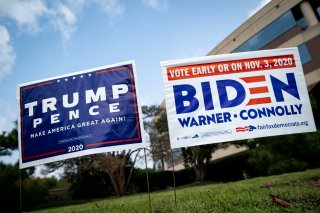Why The 2020 Presidential Debates May Not Matter
Most Americans' minds are made up by September.
On September 26, 1960, John F. Kennedy and Richard Nixon met in the first televised presidential debate. Both credit the election’s outcome to their performances in this debate. More than 100 million people watched at least one debate that year, and the third debate on October 13 was virtual, with the candidates “a continent apart.” Sixty years later, the first debate between Donald Trump and Joe Biden will take place on Tuesday night. How much impact the debate will have remains to be seen, but polls provide some context and, perhaps, some clues about people’s reactions.
Most Americans say they have already made up their minds about the 2020 contest, and some people have already voted. Since 1984, the exit poll consortium has asked voters leaving the polls when they made up their minds. The question wording has changed a little over time, but in every presidential election between 1996 and 2016, no fewer than 69 percent said they made up their minds in September or earlier. In the new issue of AEI’s Political Report, we look at this trend and also who voters planned to cast their ballots for at these various points before Election Day. In 2016, 72 percent of voters said they made their minds up in September or before, 12 percent in October, 5 percent in the last week of the campaign, and 8 percent in the final few days. Those who made up their minds in the last week voted 49 percent for Trump and 41 percent for Clinton. Those who made up their minds in the last few days split their votes evenly, 43 percent Trump to 43 percent Clinton.
In the new NBC News/Wall Street Journal poll, 3 percent of registered voters said they were not sure about their vote, and another 3 percent volunteered they would not vote for Trump or Biden or that they would vote for another candidate. In another question in the poll, more voters today (71 percent) than in 2016, 2012, 2004, or 2000 said the debates would be just somewhat or not important at all in deciding their vote for president. Eighteen percent said they debate would be extremely important. In the Quinnipiac poll released Wednesday, 94 percent of likely voters who selected a candidate say their minds are made up, while 5 percent say they might change their minds.
In an election as close as this one appears to be, a small number of undecided voters could be significant. In 2016, another close election, when the exit poll consortium asked voters about the importance of the debates to their vote, 64 percent of voters said debates were the most important or an important factor in their vote, and those voters split pretty evenly between Hillary Clinton and Donald Trump, 50 to 46 percent. The 30 percent who said debates were a minor or not important factor voted for Trump by 55 to 38 percent. Looking at the history of televised debates suggests that they seemed to matter most in 1960, when the young JFK proved his mettle to a tired-looking Nixon in that first debate, and in the debate a week before the 1980 election, when Ronald Reagan, about whom many Americans had doubts, performed well.
The 1979 AEI book, edited by AEI scholar Austin Ranney on “The Past and Future of Presidential Debates,” offered different perspectives from academics and political practitioners on the worth of debates, including pieces from Richard Cheney, Pat Caddell, and Gerald Rafshoon who had worked on the debates for Gerald Ford and Jimmy Carter. Several contributors to the volume suggested that a presidential commission be established to run the debates to take them out of the hands of politicians, and in 1987, the Commission on Presidential Debates was established.
Herb Klein, Richard Nixon’s campaign press secretary for this three presidential campaigns who spent some time at AEI later in his career, told me that for the first debate, for which he negotiated conditions for Nixon’s side, that the Kennedy team changed the paint color of the backdrop so many times that it was still wet when the debate began! Nowadays, campaigns still plan carefully for the debates, but the conventional wisdom is that they don’t change many minds. We will have to wait until the 2020 debates are over to see if that is the case.
This article first appeared at the American Enterprise Institute.
Image: Reuters.

